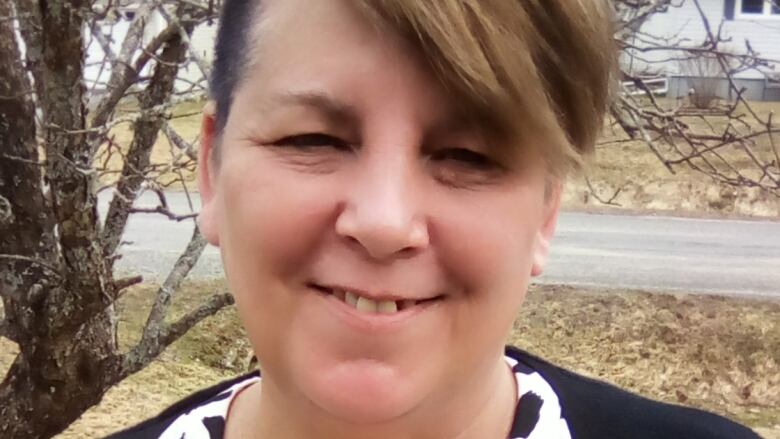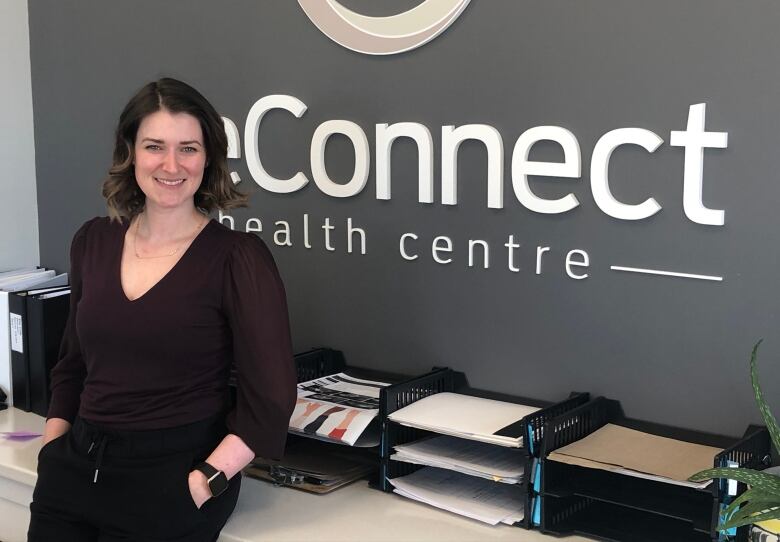N.B. woman told she must wait for uterus 'to completely drop out' before she can get help
Sherrie Hudson has been waiting for more than a year and a half to be treated for a prolapsed uterus

Sherrie Hudson of Woodstock, N.B., has been trying to get medical help for a gynecological problem since December 2019, but after more than a year, she is still suffering every day.
Hudson, 59, has a prolapsed uterus, which means the organ has slipped out of place and dropped into the vaginal canal.
Reaching doctors during the pandemic has been difficult, and she said she has instead resorted to walk-in clinics and emergency rooms, where she's been told that she'll have to wait for her condition to become an emergency before being treated.
"I'm very angry. I'm disappointed. We live in Canada where we're supposed to have a wonderful health system," she said. Hudson is among a growing number of New Brunswick women struggling to get access to timely health care.
"It's almost like, 'You're a female, this is what happens when you're female deal with it.'"
Hudson said it was her sister, a retired nurse, who first examined her after she mentioned the symptoms she was having.
"She says, 'Well, your uterus is prolapsed it's right there. It's sticking out.' And I said 'What?' I didn't even know what a prolapsed uterus was. It was falling out."
Surgery cancelled
After a trip tothe emergency room at the Moncton Hospitalin December 2019, Hudson was referred to a gynecologist, who scheduleda surgery for March 2020 to remove her uterus. The surgery was cancelled because of COVID-19 and hasn't been rescheduled.
Hudson has a family doctor in Fredericton but said it has been difficult to reachthe office during the pandemic.
Instead, she made three separate tripsto the Oromocto emergency roomto get help for her prolapsed uterus and the constant leaking of fluids it causes, which resulted in a severe bacterial infection.While she was able to get a prescription for anantibiotic, Hudsonfeels she has fallen through the cracks.
I'm not being taken care of and I'm sure there's a lot of women that aren't.- Sherrie Hudson
During one ER visit in November2020, Hudson says a doctor told her she had one of the worst infections the doctor had ever seen, but that further treatment for the prolapsewould need to wait.
"I was told that I would have to wait for either extremely heavy hemorrhaging or for the uterus to completely drop out before calling an ambulance and then they would remove it," she said. "I have all kinds of concerns."
Hudson has no expectation that anyone will be able to help her unless and until her situation becomes an emergency.
She said it's been extremely stressful, especially since she hadcancer of the cervix in her 20sand now worries the cancer may have returned.
"They've even suggested that I push my own uterus up, and I cannot do that," she said with a laugh.
"I'm not a doctor, I'm not a nurse. I just want someone to take care of me, like the good old days."

Prolapsecan impactquality of life
Katie Kelly, who is a pelvic floor physiotherapist and co-owner of Reconnect, a private women's health clinic in Moncton, said Hudson's story is "very common" among the patients she sees.
"Even if the organ has fallen most of the way out, they are coached to 'reduce' the prolapse by putting it back in," Kelly said. "We treat this a lot in pelvic floor physio while they wait for surgery."
She said treatment can involve teaching patients methods that will keep the uterus from coming out as often, as well as how to monitor for infection and how to do Kegels, a type of exercise meant to strengthen the pelvic floor muscles.
Kelly saidwhile it isn't a medical emergency, a prolapsedoeshave a significant impact on a woman's quality of life and most are "shocked and scared" when it happens to them.

Hudsondecided to share her very personal story after readingabout New Brunswickwoman Mhairi Agnew's attempts to get help for ongoing abdominal pain in the public health-care system, before finally paying out-of-pocket to see a gynecologist at a privateclinic.
"I thought she was very brave," Hudson said of Agnew, 20, who shared her story earlier this month."Thank goodness someone has spoken up and I wasn't surprised by her situation.
"I mean, should women really have to suffer?"
Health-care system challenged, minister says
Several years ago, the New Brunswick Medical Society began calling for a review of "women's health and reproductive services," including gynecological care, family planning and fertility, and has also raised it with the current government.
New Brunswick Minister of Health Dorothy Shephard said she is aware of two vacancies in New Brunswick for gynecologists.
"Every single aspect of our health-care system is challenged right now," she said. "And women in particular I think we have to pay attention."

Some of the stress on the system could be relieved, Shephard said, ifall doctors, specialists and nurse practitioners work within the publicly funded Medicare system, rather than working in private clinics or for private online health-care providers.
Shephard'sfocus is on eliminating the waiting list for primary care within six months and on recruitment.
Even though her wait for medical help continues,Hudson said that she's happy Agnew shared her story, and that women's health is finally being discussed openly.
"I'm not being taken care of, and she wasn't, and I'm sure there's a lot of women that aren't."












_(720p).jpg)


 OFFICIAL HD MUSIC VIDEO.jpg)
.jpg)



























































































